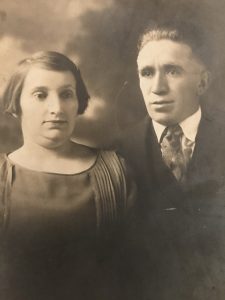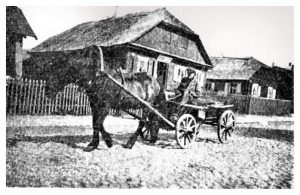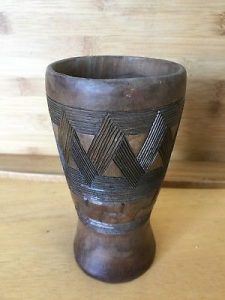 When my grandfather emigrated from Lithuania to America his name was changed at Ellis Island from Karbelnikoff to Karp. I don’t think he had much say in the matter. America is a practical, industrious place and I’m sure like so many other immigrants, he wanted to fit in. What a natural feeling.
When my grandfather emigrated from Lithuania to America his name was changed at Ellis Island from Karbelnikoff to Karp. I don’t think he had much say in the matter. America is a practical, industrious place and I’m sure like so many other immigrants, he wanted to fit in. What a natural feeling.
But to fit in to the practical, individualistic ethos of this country, I feel that my ancestors, and millions of others, had to separate and disassociate from many of the more spiritual, poetic and ethnically identified parts of themselves. This in turn led to a lot of challenges with alcoholism and mental illness, at least in my family lineage. I have heard that the Slavic immigrants were particularly challenged in this regard—the split between their home culture and American culture being too severe for their souls to bridge.
If you look in the eyes of my grandmother and grandfather in this photo I think you can get a glimpse of this dissociation.
I feel deeply connected to the spirituality of the Slavic peoples and to the soulfulness of my Russian-Lithuanian Jewish heritage and for many years now I have wanted to change my name back to Karbelnikoff in order to honor this lineage, and support my own soul’s efforts to reconcile and harmonize spirituality and practicality, community and self, body and soul.
I tried to make this name change about 10 years ago, but discovered that since 9-11 the business of changing one’s name has become very complicated legally so I dropped the effort. But recently, the impulse came back and I realized that I could simply begin using the name Karbelnikoff as a free, cultural name, while still retaining Karp for legal and professional reasons.
It only occurred to me a few days ago that this name change coincides with my having more and more to do with the work of Thoreau College and other projects in the Driftless Area of the upper Midwest, where I feel deeply at home and which in fact is where my grandfather lived and where my father spent his childhood. Clearly, there is a process of ancestral and personal healing taking place in all this.
Over the years various Russian and Lithuanian people have shared with our family different meanings of the name Karbelnikoff, each of which resonates for me deeply. I don’t know the accuracy of these interpretations, but they certainly speak to me poetically.

First, we have been told it refers to the little cart that Jewish peddlers would use to sell things out of as they traveled around the countryside in Russia. This resonates to my work developing new models and imaginations for the future of economic life, particularly as it relates to agriculture.
We have also been told that it means “ship builder.” This resonates with my work helping groups of people come together as a vessel for a higher, collective purpose and intelligence to work among them and thus travel somewhere as a group of people, not just as individuals.

We have also been told it means “goblet carver.” This resonates with my interest in the sacred, in spiritual science and in the sacramentalization of all life.
For these reasons and many others, I feel connected to this name and wish to associate myself with it and with them, my beloved ancestors, and with the mighty traditions and communities in which they were embedded and which I know live on in me as well.

Thanks in advance to my friends, family and colleagues for making this change and this name part of your vocabulary!